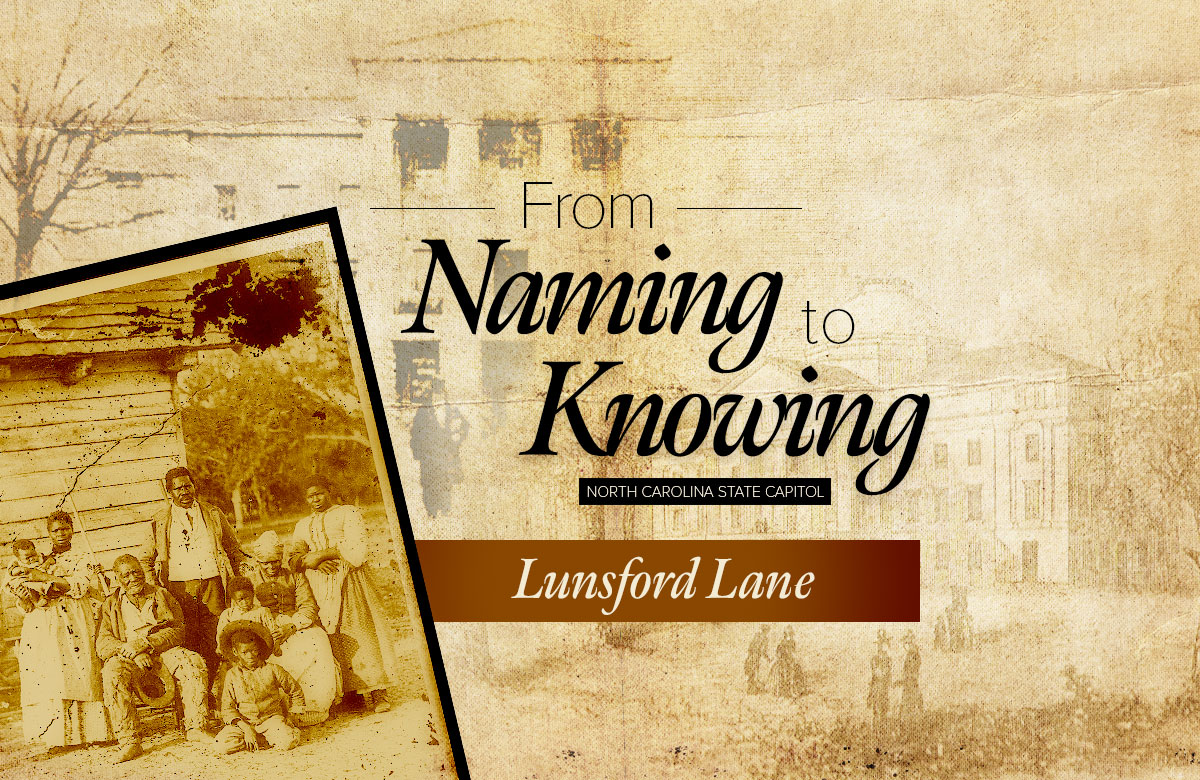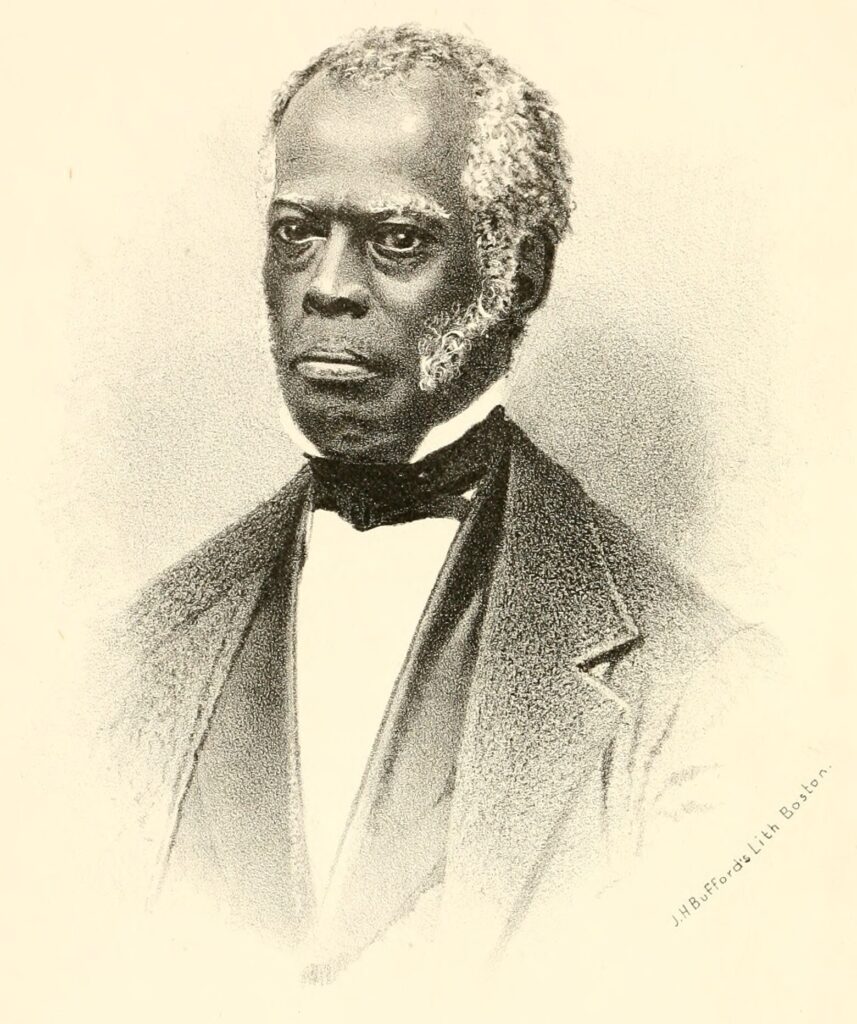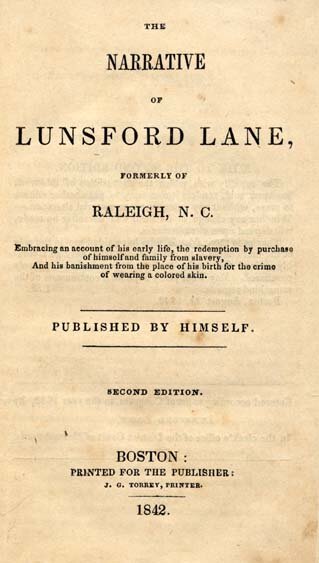

Lunsford Lane
Lunsford Lane’s story differs from many found on this site. While he was initally enslaved, Lunsford was free by the time he worked in the Capitol. Lunsford was born in Raleigh on May 30, 1803, the only child of Clarissa and Edward Lane. Edward was enslaved originally by Colonel Joel Lane. Following Joel Lane’s death, Edward was willed to his wife Mary and then eventually bought by State Treasurer John Haywood. Clarissa was enslaved by Raleigh planter and bank agent Sherwood Haywood, John Haywood’s brother. From an early age, Lunsford desired to be free and worked diligently toward that goal. Growing up, he worked in the home of Sherwood Haywood, and he acknowledged in his autobiography that this position gave him opportunities, saying “This was a privilege which comparatively few slaves at the South enjoy; and in this I felt truly blessed.”
In 1828, Lunsford was married to Martha Curtis. Together they would have seven children. By 1835, Lunsford had saved enough and was able to purchase his freedom for $1000. Sherwood Haywood was willing to manumit Lunsford, but in North Carolina laws stated that manumission must be granted by a court. The court ruled Lunsford had not done anything “meritorious” to earn his freedom. In 1835, Lunsford traveled to New York and became free. He returned to North Carolina, where he purchased a home. His family was permitted to live with him, though they remained enslaved. During this time, he worked in the Capitol supplying tobacco to the Governor and members of North Carolina’s General Assembly. In the late 1830s, Lunsford was faced with a court battle to determine whether or not he, as an emancipated Black person, could remain in North Carolina. The law at the time stated that, “It shall not be lawful for any free negro or mulatto to migrate into this State.” Though several prominent White Raleigh citizens (including the Governor’s private secretary) came to Lunsford’s aid to sign his petition and vouch for him, he lost his proposal and left North Carolina.
Lunsford moved to Boston in 1841, and by 1842 he had raised money to purchase his wife, children, and mother. He returned to Raleigh to purchase his family, and though he was assured by various people including Governor John Motley Morehead that he was unlikely to encounter resistance to his mission in Raleigh, Lunsford was arrested. He was charged with delivering abolitionist lectures while living in the North. When arrested, Lunsford explained to the court that he only wished to raise money to purchase his family, and he also produced a letter in which Governor Morehead promised that he would be able to safely return to Raleigh. The court accepted this and released Lunsford, but a mob gathered and seized him. Of this situation, Lunsford wrote, “what the rabble wanted was to get me into their possession, and then to murder me. The mob looked dreadfully enraged, and seemed to lap for blood. The whole city was in an uproar. But the first men and the more wealthy were my friends: and they did everything in their power to protect me.” Lunsford escaped death, but was tarred and feathered.
After this experience, Lunsford and his family moved to Boston, where he worked with members of the abolitionist community, speaking on the abolitionist circuit. He later wrote The Narrative of Lunsford Lane, Formerly of Raleigh, N.C. Embracing an Account of His Early Life, the Redemption by Purchase of Himself and Family from Slavery, and His Banishment from the Place of His Birth for the Crime of Wearing a Colored Skin. Published by Himself. During the Civil War, he worked in a hospital with his wife, and following the war, Lunsford helped establish a Freedman’s School near New Bern, NC. Lunsford died of a heart attack in 1879.

References:
- Lane, Lunsford. The Narrative of Lunsford Lane, Formerly of Raleigh, N.C. Embracing an Account of His Early Life, the Redemption by Purchase of Himself and Family from Slavery, and His Banishment from the Place of His Birth for the Crime of Wearing a Colored Skin. Published by Himself. Boston: J.G. Torrey, Printer, 1842.
- “Lunsford Lane.” North Carolina Highway Historical Marker Program Essay. http://www.ncmarkers.com/Markers.aspx?MarkerId=H-125.
Comments are closed.




The Rasp. (Raleigh, N.C.) April 30, 1842, Edition 1, Image 3: https://newspapers.digitalnc.org/lccn/sn92073007/1842-04-30/ed-1/seq-3/#words=Lane+Lunsford
The Rasp. (Raleigh, N.C.) May 21, 1842, Edition 1, Image 3: https://newspapers.digitalnc.org/lccn/sn92073007/1842-05-21/ed-1/seq-3/#words=LANE+LUNSFORD
The North-Carolina standard. (Raleigh, N.C.) May 13, 1846, Edition 1, Image 3: https://newspapers.digitalnc.org/lccn/sn85042147/1846-05-13/ed-1/seq-3/#words=Lane+LANE+LUNSFORD+Lunsford